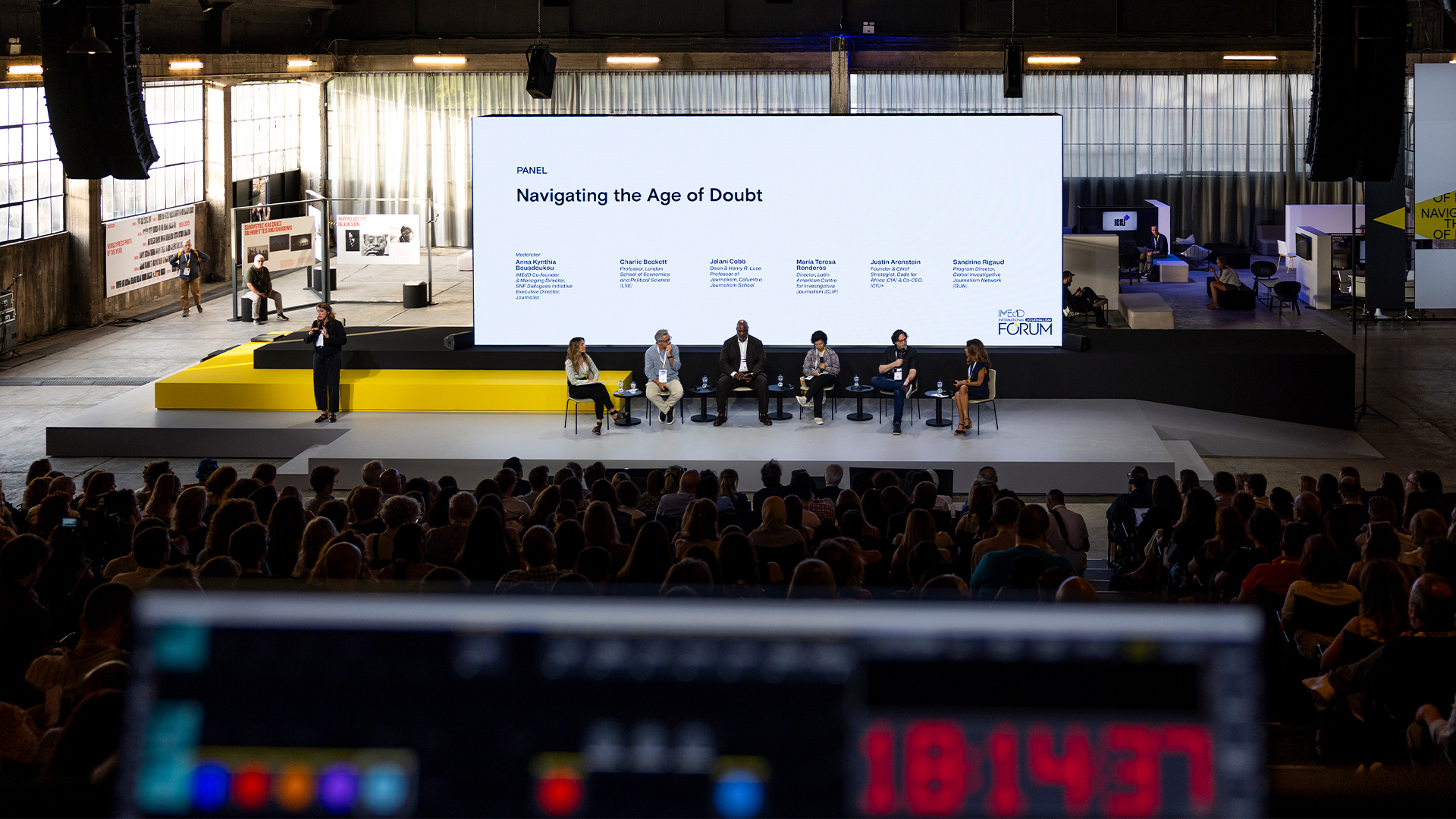The opening panel of the iMEdD International Journalism Forum 2025 highlighted a profession in flux, balancing threats and opportunities, technology and human values, skepticism and public service.
Photos: Alex Grymanis, Christos Karagiorgakis / iMEdD
The opening panel of this year’s iMEdD International Journalism Forum, titled “Navigating the Age of Doubt”, brought together leading voices in journalism to explore the profession’s evolving landscape amid technological disruption, news avoidance, misinformation, declining trust, media capture, and increasing threats to press freedom and reporters worldwide.
Moderator Anna Kynthia Bousdoukou, iMEdD Co-founder and Managing Director and SNF Dialogues Initiative Executive Director, set an urgent tone, framing the discussion around these pressing issues. She emphasized that journalists’ central role remains “to serve the public” and “keep power in check,” before challenging the panelists to assess the current state of journalism. Moments ago, in her opening remarks, she had posed an even more urgent question: “Is anyone listening, or are we talking to ourselves?”, wondering if news avoidance is here to stay.
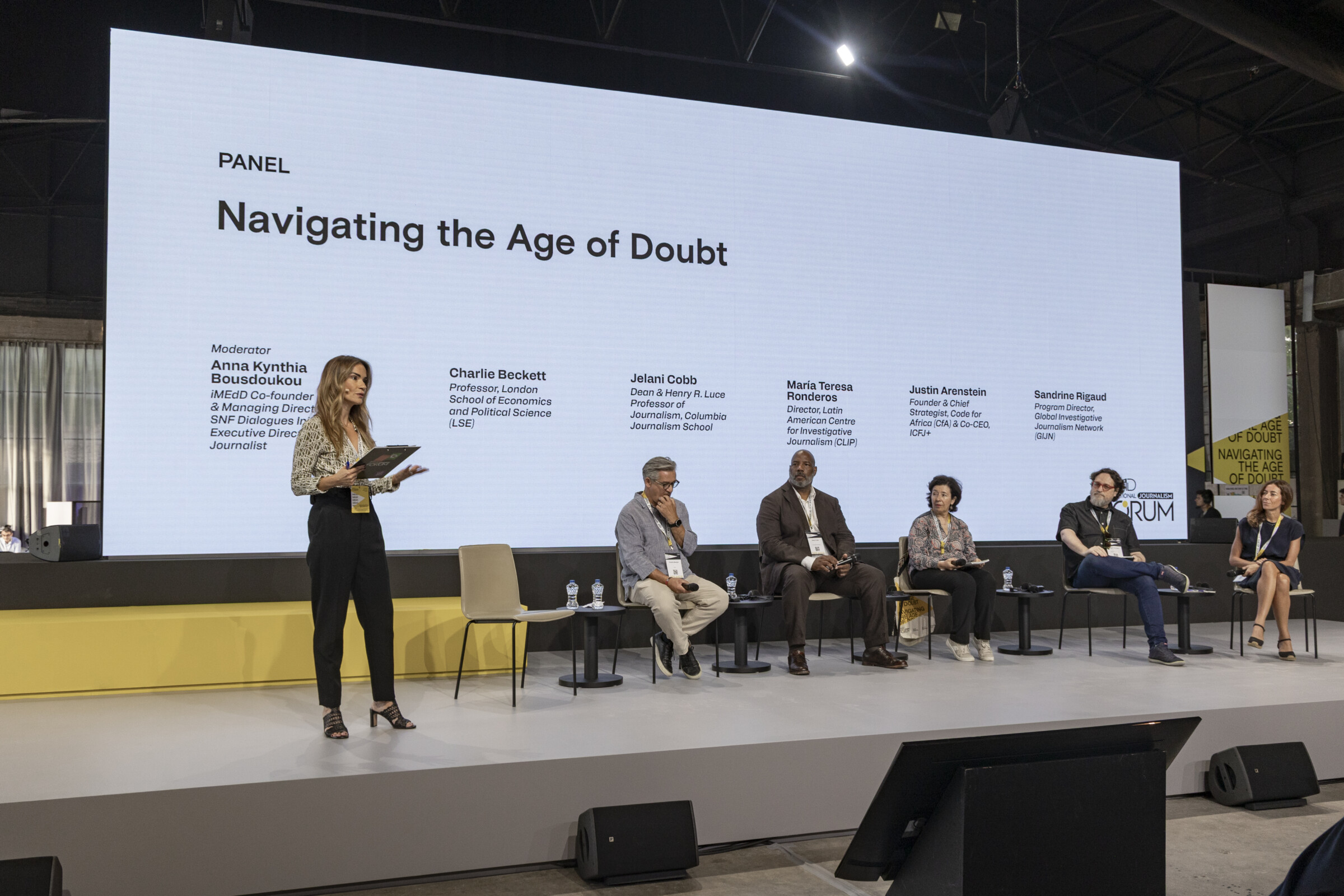
The state of journalism today
Sandrine Rigaud, Program Director of the Global Investigative Journalism Network (GIJN), opened the discussion on a cautiously optimistic note. Citing a landmark case in France, she highlighted the continued relevance of investigative journalism: “Our work has impact. We’re still relevant,“ Rigaud said, referencing the investigation that led to former president Nicolas Sarkozy’s conviction. Yet, she acknowledged the existential pressures facing the field: authoritarian regimes silencing journalists, billionaires considering journalists as nuisance that they can bypass, and the collapse of traditional business models.
Justin Arenstein, Founder and Chief Strategist of Code for Africa (CfA) and Co-CEO of ICFJ+, emphasized the uncertainty many newsrooms face about their audiences. “Editors and senior journalists are even doubting who their audiences are anymore: Who are we writing for —is it an algorithm, an AI bot, (…) or humans as a primary audience?“ he said. He stressed that journalism must evolve from storytelling to sense-making, helping the public navigate complex information ecosystems rather than merely consuming content.
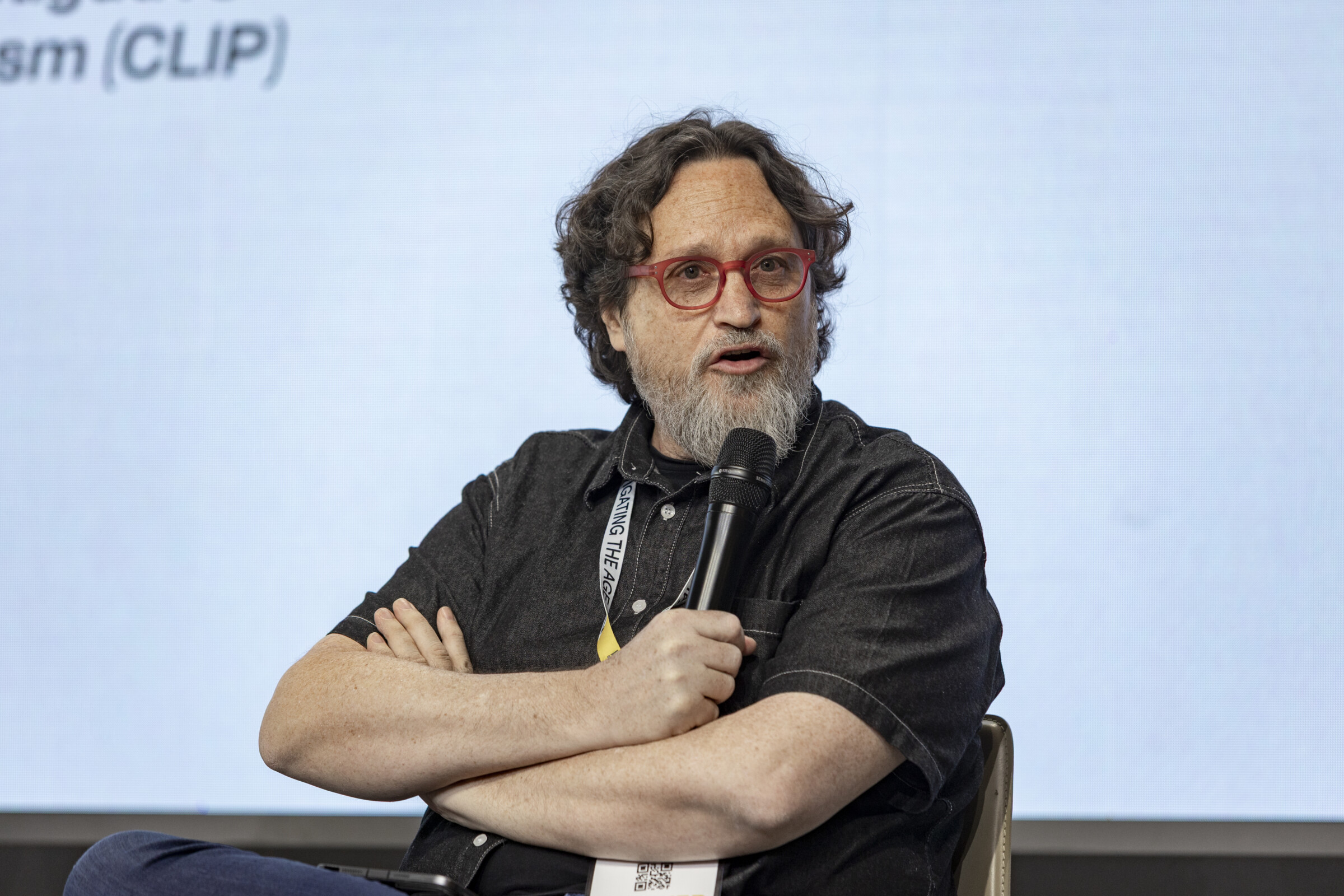
Editors and senior journalists are even doubting who their audiences are anymore: Who are we writing for —is it an algorithm, an AI bot, or humans as a primary audience?
Justin Arenstein, Founder and Chief Strategist of CfA and Co-CEO at ICFJ+.
Maria Teresa Ronderos, Director of the Latin American Centre for Investigative Journalism (CLIP), framed the industry’s current moment as transformative: “Many media are scared and trying to do witch hunting; They’re attacking everybody who’s not a journalist”. She stressed collaboration and public engagement as key strategies, noting the potential for audiences to contribute knowledge in investigative processes.
Jelani Cobb, Dean & Henry R. Luce Professor of Journalism at the Columbia Journalism School, offered a dual perspective: “It’s the best of times, it’s the worst of times (…) We’re capable of doing journalism in ways that would astonish earlier generations of journalists. We’re capable of doing investigations that would have been beyond the reach of journalists who came before us.” He emphasized the enduring societal necessity of journalism despite declining public trust and increasing danger for reporters.
Charlie Beckett, Professor at the London School of Economics and Political Science (LSE), highlighted the paradoxical opportunities of the so-called age of doubt: “If you lived in an age of certainty, you would be very bored (…) The ability to do individual acts of journalism has never been more extraordinary.” Beckett noted the growing importance of AI, urging journalists to focus on human values, connectivity, and community engagement rather than fearing technological disruption.
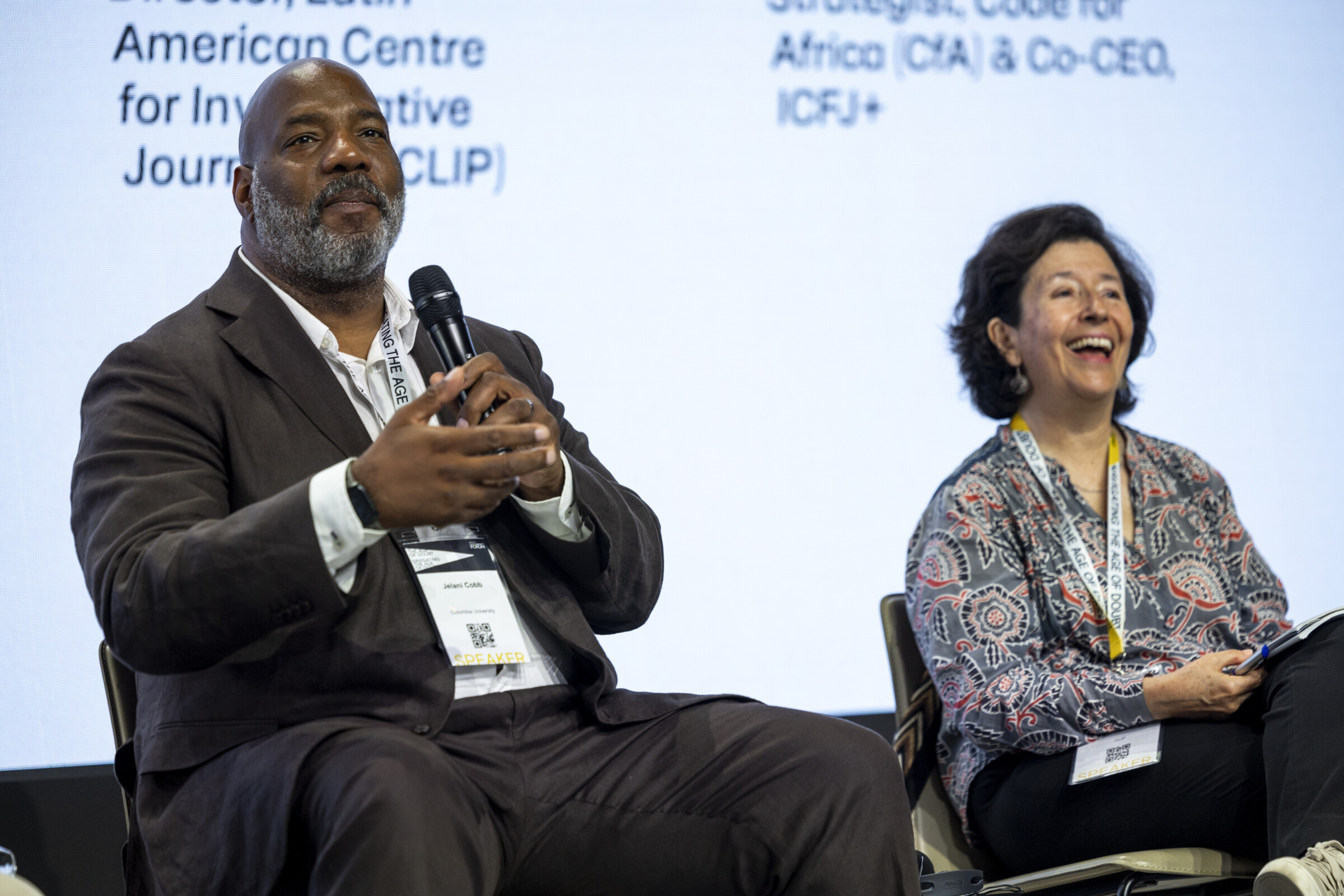
We’re capable of doing journalism in ways that would astonish earlier generations of journalists. We’re capable of doing investigations that would have been beyond the reach of journalists who came before us.
Jelani Cobb, Dean & Henry R. Luce Professor of Journalism at the Columbia Journalism School
Engaging the audience in a fragmented media landscape
By invoking the phrase “it takes two to tango,” Bousdoukou made audience engagement central to the discussion. She reminded the audience that journalism does not exist in isolation. Rather, one of journalism’s bets is making people care. The discussion then turned to public engagement and the people’s relationship with news. Ronderos described experimental models that involve audiences in the production of news, likening it to large-scale source verification: “Audiences know more about many subjects than we do, and we want them to participate with us.”
Arenstein stressed that news consumption is increasingly filtered through social validation and peer networks, rather than traditional brand recognition. “People are not finding media through brand recognition. It’s through affirmation of what others in their trust circle or group (…) It’s about does it really resonate as true in the world that I live in,“ he said. Cobb warned against the dangers of echo chambers, contrasting journalism’s obligation to deliver difficult truths with the parasocial media environment, which does not have that obligation (it can instead reinforce pre-existing biases).
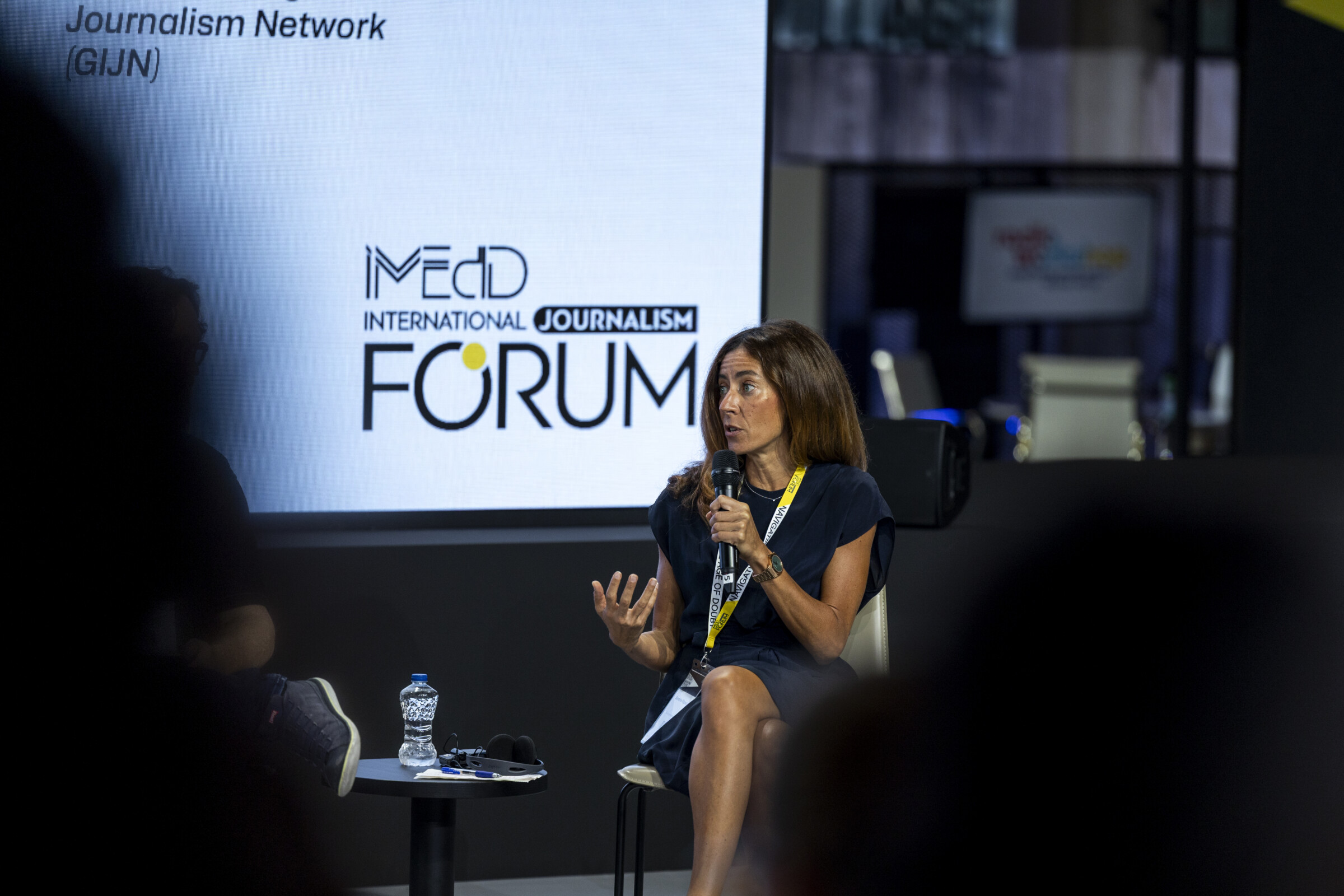
Sandrine Rigaud also spoke about the risks journalists take in pursuit of stories. “When a journalist is killed, it’s usually because they were working on a huge story of public interest,” she said, highlighting collaborative reporting networks to protect journalists and amplify impact.
When a journalist is killed, it’s usually because they were working on a huge story of public interest.
Sandrine Rigaud, Programs Director of GIJN
Reframing trust and news consumption
Setting the stage for the trust debate, moderator Anna Kynthia Bousdoukou asked whether the greatest challenge lies in “trust or attention.” In this way, she highlighted the dual pressures and the struggle to capture audiences amidst an endless stream of online distractions. Her question sparked a lively discussion, and the panelists were unanimous in critiquing the conventional narrative around declining trust in the media. Beckett argued: “Why are we beating ourselves up? Because there are surveys that say the public don’t entirely trust journalism as a whole (…) I agree with Maria Ressa, who says this is actually a tool that’s being used by authoritarian regimes to undermine what good journalists do”.
Cobb pointed out that audiences are inherently skeptical: “Journalists are some of the least trusting people in the world. We don’t trust anybody as a professional virtue. We’re not supposed to. We’re supposed to be skeptical. And so, we can’t be upset if people turn our own professional protocols on us. My argument has been that we don’t have to regain the trust of the public. We just need the public to be as skeptical of all other sources of information as they are of us”. The goal, he argued, is transparency and explanation —showing audiences not just what journalists report, but how and why.
Journalists are some of the least trusting people in the world. We’re supposed to be skeptical. We can’t be upset if people turn our own professional protocols on us.
Jelani Cobb, Dean & Henry R. Luce Professor of Journalism at the Columbia Journalism School
Looking forward: Public engagement, collaboration, and technology
Throughout the discussion, engagement and collaboration —both among journalists and with audiences—emerged as a recurring theme. Rigaud, Arenstein, and Ronderos emphasized the power of networks to pursue cross-border investigative journalism.
The panel concluded with the AI question, which is inevitable. Rigaud recounted how some reporters now start deep investigations by prompting an AI instead of Googling. “In five minutes, they would have the result of the work of two weeks of investigation. But one thing AI will never be able to do is go out and meet with people and just report on the ground,” she said. “In a way it brings us to the roots of our job, being there out in the field.”
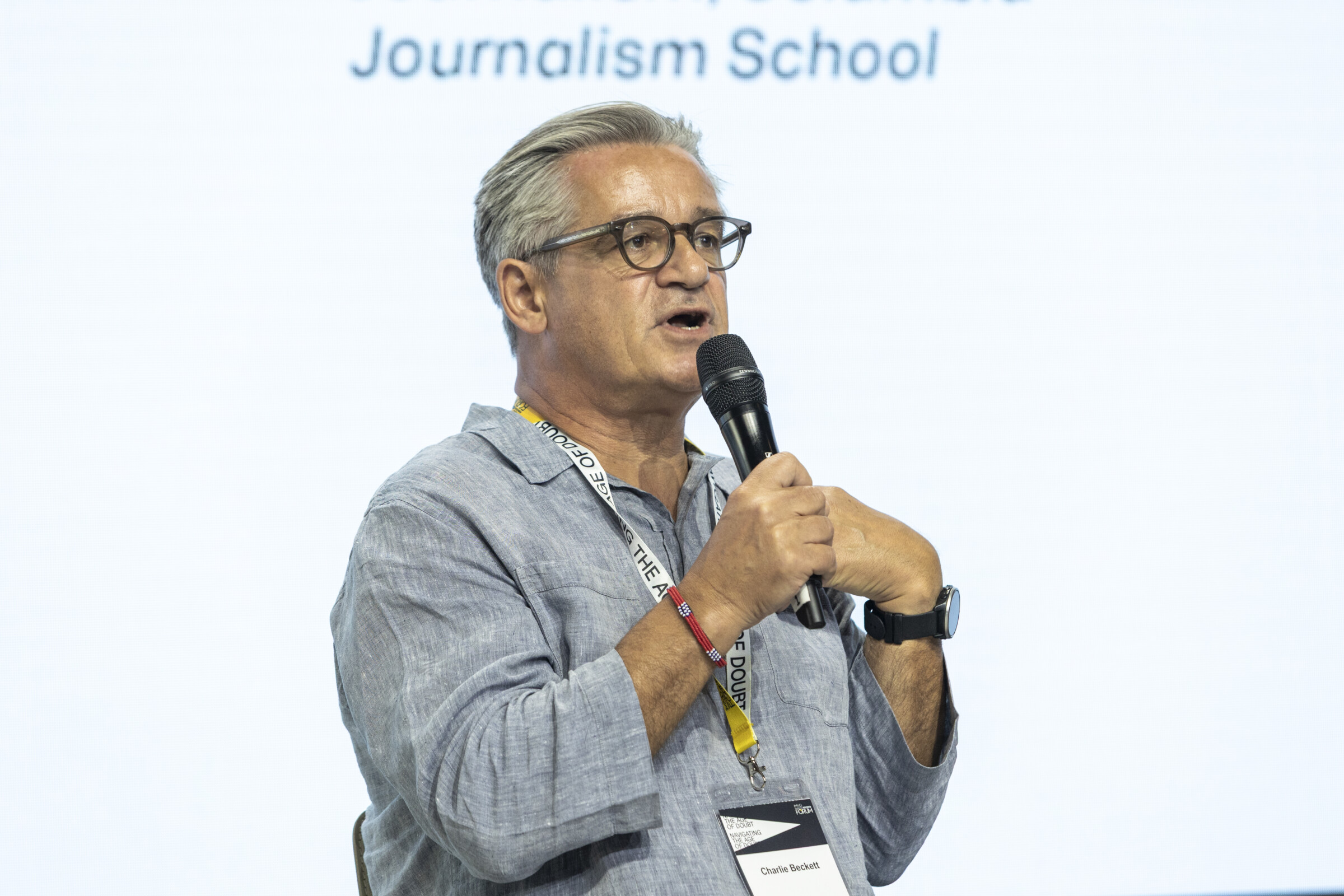
Arenstein noted that we are going to have “walking chatbots”, but framed AI as a neutral technology — “it’s what we do with it (…) how we leverage that in terms of both creativity and responsibility,” said. “We need to look at this very critically and figure out what to do, so that we don’t make the same mistakes like we did with search and with social [media], where we stood back or were co-opted by the very large platforms that want to make money off us”.
I am much more worried about AI being used in defense or crime or security or even in medicine than I am if a few journalists start to use ChatGPT.
Charlie Beckett, Professor at LSE
Beckett agreed, but he also warned that he is “much more worried about AI being used in defense or crime or security or even, in some ways, medicine (…) I’m much more worried about the power of big companies like Palantir than I am if a few journalists start to use ChatGPT. And that is why everybody who calls themselves a journalist, or works with journalists, should know much more about AI, because it’s going to be part of the world that you are supposed to be reporting upon”.
Watch the full panel on demand here

